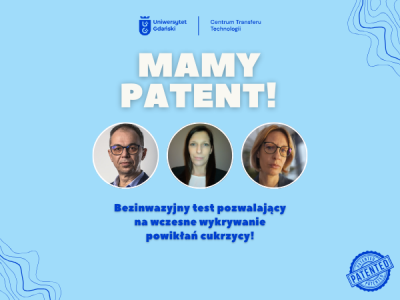
A team of scientists from the Faculty of Chemistry at the University of Gdańsk, led by prof. dr hab. Adam Lesner, has patented an innovative diagnostic test enabling non-invasive (urine-based) early detection of nephropathy (kidney dysfunction) as a complication of diabetes. The work on the invention was carried out in close cooperation with the team of prof. dr hab. Agnieszka Piwkowska from the Institute of Experimental and Clinical Medicine of the PAS.
Diabetes is a disease that affects millions of people worldwide. Among its many complications is nephropathy, or kidney dysfunction. Diagnosis is often too late to protect patients from permanent kidney damage. Scientists from the University of Gdańsk have patented a simple, non-invasive diagnostic method based on the analysis of a small urine sample. The test allows the disease to be detected at an early stage, before sugar appears in the urine.
Researchers from the Faculty of Chemistry at the University of Gdańsk have proposed the use of fluorescently labelled derivatives of two peptides that undergo hydrolysis when they come into contact with one of two proteolytic enzymes, ADAM10 or ADAM17. These enzymes show significantly increased activity in the urine of people with diabetes at a very early stage of the disease. When fluorescently labelled derivatives of synthesised peptides are used, their hydrolysis under the influence of enzymes can be easily detected by observing an increase in the concentration of labelled decomposition products in the test sample (e.g. an increase in fluorescence). In healthy individuals whose urine does not contain the aforementioned enzymes, no hydrolysis will occur.
‘The research we conducted would not have been possible without the team of Prof. Agnieszka Piwkowska from IMDIK PAS, who initiated the work on ADAM family enzymes. They concern both the diagnosis of diabetes and its early complications, such as diabetic nephropathy, which, if detected early enough, is a reversible disease,’ says prof. Adam Lesner. ‘Currently, the diagnosis is made on the basis of symptoms or accidentally during a routine urine test. In many cases, it is already too late for effective treatment, and the alternative is dialysis or organ transplantation. In this context, early detection of such complications of diabetes is extremely important and necessary.’
The team of researchers from the University of Gdańsk included: prof. Adam Lesner, dr Magdalena Wysocka, prof. UG and dr Natalia Gruba. The research was conducted in close cooperation with prof. Agnieszka Piwkowska, dr Dorota Rogacka and dr Irena Audzeyenka - scientists from the Institute of Experimental and Clinical Medicine of the PAS (co-owners of the patent).
Prof. Adam Lesner and dr Natalia Gruba had previously patented a diagnostic test for detecting cancer of the urinary tract epithelium, which has already been commercialised (more on this here: Successful commercialisation of a test for urinary tract cancer developed by scientists at the University of Gdańsk | News - University of Gdańsk).
The scientists were assisted in obtaining patent protection by the Technology Transfer Office of the University of Gdańsk.
